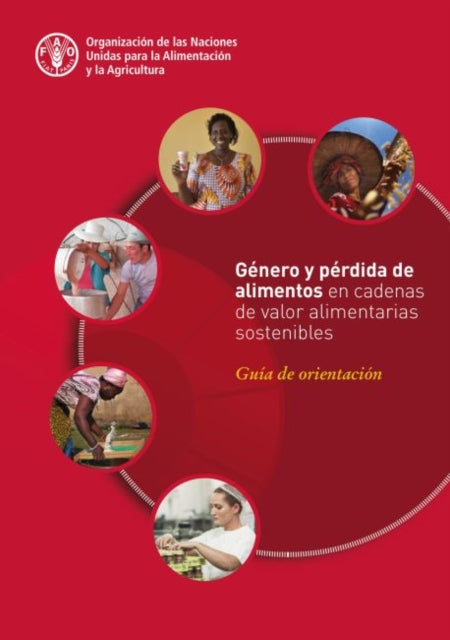Food and Agriculture Organization of the United Nations
Genero y perdida de alimentos en cadenas de valor alimentarias sostenibles: Guia de orientacion
Genero y perdida de alimentos en cadenas de valor alimentarias sostenibles: Guia de orientacion
YOU SAVE £12.05
- Condition: Brand new
- UK Delivery times: Usually arrives within 2 - 3 working days
- UK Shipping: Fee starts at £2.39. Subject to product weight & dimension
Bulk ordering. Want 15 or more copies? Get a personalised quote and bigger discounts. Learn more about bulk orders.
Couldn't load pickup availability
- More about Genero y perdida de alimentos en cadenas de valor alimentarias sostenibles: Guia de orientacion
Gender inequalities in the food value chain impact efficiency and this publication provides guidance on integrating gender concerns into food loss studies and reduction strategies.
Format: Paperback / softback
Length: 52 pages
Publication date: 28 February 2019
Publisher: Food & Agriculture Organization of the United Nations (FAO)
Gender inequalities have a significant impact on the efficiency of the food value chain. This publication aims to assist policy-makers, project designers, and field practitioners in understanding the relationship between gender equality and food loss, while providing practical guidance on integrating gender considerations into the planning and implementation of food loss studies, reduction strategies, and interventions.
Gender inequalities manifest themselves in various ways throughout the food value chain, affecting its overall efficiency. For instance, women often face barriers to accessing resources, such as land, credit, and technology, which can limit their ability to participate in agricultural activities and contribute to food production. Additionally, women may face gender-based discrimination in the workplace, including unequal pay and fewer opportunities for advancement, which can lead to lower job satisfaction and increased turnover rates.
Furthermore, gender inequalities can impact food loss at different stages of the value chain. For example, women may be responsible for post-harvest processing and storage, which is critical for maintaining the quality and safety of food. However, they may lack access to the necessary equipment, training, and support, which can result in food spoilage and waste. Additionally, women may face social and cultural barriers that prevent them from selling their produce at market, leading to higher food loss and income inequality.
To address these challenges, it is essential to integrate gender considerations into the planning and implementation of food loss studies, reduction strategies, and interventions. This can involve promoting gender equality through policies and programs that support women's access to resources and opportunities, such as land reform, credit programs, and training initiatives. Additionally, it is important to address gender-based discrimination in the workplace and provide equal opportunities for women to participate in agricultural activities and contribute to food production.
In addition to promoting gender equality, it is also important to consider the role of men in addressing food loss and promoting gender equality. Men can play a critical role in supporting women's agricultural activities and promoting gender equality in the workplace. For example, men can provide financial support to women's agricultural enterprises, participate in decision-making processes related to food production and distribution, and advocate for gender-sensitive policies and programs.
Furthermore, integrating gender considerations into food loss studies, reduction strategies, and interventions can have broader benefits beyond improving the efficiency of the food value chain. It can contribute to reducing food insecurity, improving nutrition, and promoting sustainable development. By addressing gender inequalities and promoting gender equality, we can create a more equitable and sustainable food system that benefits all stakeholders, including women, men, and children.
In conclusion, gender inequalities have a significant impact on the efficiency of the food value chain, affecting access to resources, job satisfaction, and food loss. By integrating gender considerations into the planning and implementation of food loss studies, reduction strategies, and interventions, we can create a more equitable and sustainable food system that benefits all stakeholders. This requires promoting gender equality through policies and programs, addressing gender-based discrimination in the workplace, and engaging men in promoting gender equality.
Weight: 176g
Dimension: 177 x 248 x 17 (mm)
ISBN-13: 9789251306840
This item can be found in:
UK and International shipping information
UK and International shipping information
UK Delivery and returns information:
- Delivery within 2 - 3 days when ordering in the UK.
- Shipping fee for UK customers from £2.39. Fully tracked shipping service available.
- Returns policy: Return within 30 days of receipt for full refund.
International deliveries:
Shulph Ink now ships to Australia, Belgium, Canada, France, Germany, Ireland, Italy, India, Luxembourg Saudi Arabia, Singapore, Spain, Netherlands, New Zealand, United Arab Emirates, United States of America.
- Delivery times: within 5 - 10 days for international orders.
- Shipping fee: charges vary for overseas orders. Only tracked services are available for most international orders. Some countries have untracked shipping options.
- Customs charges: If ordering to addresses outside the United Kingdom, you may or may not incur additional customs and duties fees during local delivery.


